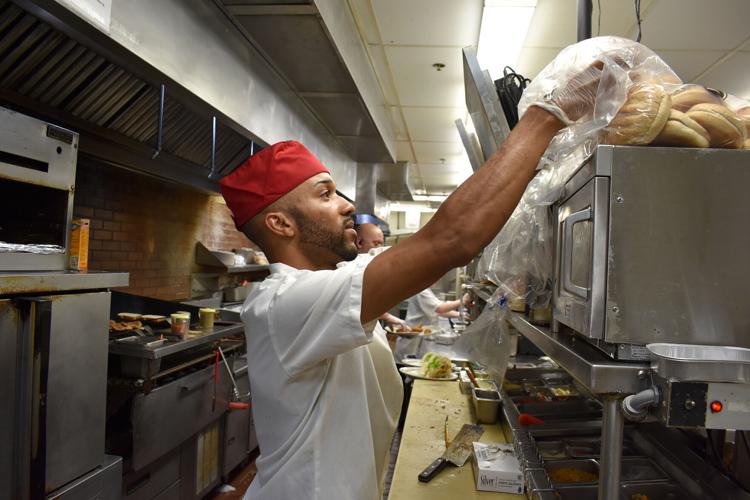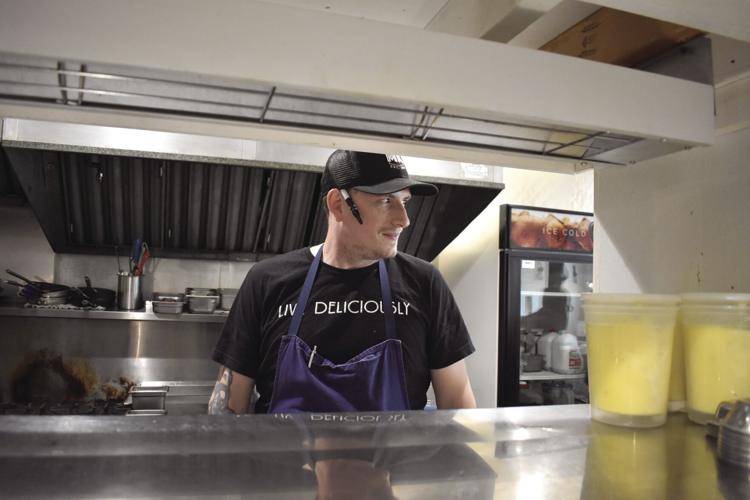After a year that presented an existential threat to many restaurants, you couldn’t blame a restaurateur for hoping for an easy 2021. Yet, this year has proven to have its own set of challenges that likely weren’t factored into pre-pandemic business plans.
Mike Somers, CEO and President of the New Hampshire Lodging and Restaurant Association, said he’s been involved in the hospitality industry for more than 20 years, and hasn’t seen the challenges of 2021. The latest shoe to drop: restaurants can’t count on distributors to bring the food that they’ve ordered.
Somers said he’s never seen anything like it before. “But then, we’ve never seen a COVID before either, we’ve never seen worker shortages like this, this is one more item on the list, and it’s making things very challenging,” he said. “We’re hearing this all across the country, this is not a localized phenomenon.”
It’s a big problem, Somers said about uncertainty of whether the distribution truck will have what was ordered, if it shows up at all. At the beginning of this month, a summer camp in Moultonborough told parents to come pick up their campers, because the camp wouldn’t be able to feed them as they had planned.
The problem comes down to labor, Somers said. The distributors don’t have enough warehouse workers to pack the trucks, nor do they have enough drivers to service their customers. In fact, the problem goes even further up the supply chain. Meat processing facilities don’t have enough meat cutters, Somers said, so they can’t operate at a normal capacity.
“They are facing the same issues as restaurants,” Somers said. “We are limiting days of the week, we are shortening hours, we are limiting menus… It’s becoming a global problem.”
Somers has heard stories that he never thought he would hear about the restaurant industry. He’s heard of small restaurants teaming up to pick up bulk orders from a distribution center, then delivering supplies to their competitors. He’s also heard about distribution company executives working on the warehouse floor to move as much food as they can.
“I also heard a rumor that the presidents of some of these companies are legitimately driving trucks themselves,” Somers said.
The labor shortage has cut back the business at T-Bones and Cactus Jack’s in Laconia, said head manager Lori Contraros.
“We have always done really well with the front of the house,” Contraros said, referring to the workers diners see, such as servers and hosts. It’s the so-called back of the house staff that is thin, and T-Bones is so short that they’ve reduced the number of days they’re open.
“We are really hurting for kitchen staff. We only have so many cooks, and not many people applying,” Contraros said. If she could hire 12 more kitchen staff, she could go back to seven-days-per-week, which is what they usually do in the summer. But she just doesn’t have the chefs, cooks and dishwashers to schedule. So the door remains locked on Mondays.
“We need to protect our employees, people need two days off or we’re going to lose people,” Contraros said.
Perhaps because of the size of the company, which operates many restaurants in the southern part of the state, the T-Bones in Laconia has been sheltered so far from distribution headaches. Contraros said that the worst such example she’s seen is that their usual takeout containers had to be switched to another, comparable product, due to availability.
“Supply chain has been pretty good, some minor things here and there,” she said.
Smaller eateries, such as Margaret’s Kitchen in Sanbornton, haven’t been so lucky. Dustin Martel, chef and owner at Margaret’s, said he has the opposite problem of Contraros. He has a full staff of dependable employees, but he can’t count on getting a resupply if he sells more than he anticipated.
“On Mondays, I’ve had trouble getting product, especially if we have a busy weekend,” he said. Margaret’s is a breakfast and lunch place, and he’s had to close on a Monday, when he’s usually open, because he ran out of eggs. And eggs’ dancing partner, bacon, has been even more troublesome for Martel.
Martel is picky when it comes to his bacon. He had been getting it from North Country Smokehouse in Claremont, which was supplying him with super-thick slices of bacon. But he wasn’t able to get any from them for the past two weeks, despite putting in three orders, through two different distributors, in one week. Coming to his rescue has been the Fox Country Smokehouse in Canterbury. Martel said he’s been happy with the replacement bacon, but heard that even Fox Country is unsure if it will be able to continue to source enough pork bellies to keep Margaret’s Kitchen diners in bacon.
“I can’t not have bacon,” Martel said.
Sometimes keeping items in stock comes with a price tag, though. He said that a case of chicken, necessary for Martel because he serves fried chicken and waffles, cost $45 last year. That same case of chicken now costs 60% more, at $72.
Ed Brylczyck, general manager of distributor Dole & Bailey, said he’s seeing broad instability in the meat market, all due to labor shortages.
“A lot of the processing facilities out in the midwest that would have 400 to 500 employees on their processing floor, they have less than half capacity because they can’t get people on the floor,” Brylczyck said. Dole & Bailey has fared better than most distributors, Brylczyck said, because they were able to keep all of their employees through the pandemic by pivoting to retail provisioning. That has made it possible for them to catch the surge of demand when restaurant activity ramped up this year, while other competitors were swamped.
Dole & Bailey added 65 new accounts within a month-and-a-half, Brylczyck said. Dole & Bailey is now up to 2,200 customers across the Northeast, with about a third of those in New Hampshire.
Even for Dole & Bailey, it hasn’t been smooth sailing, Brylczyck said. Their sales are now well ahead of their 2019 numbers, and their growth will be limited by their ability to hire more drivers and to make better use of the employees they have. One challenge, he said, is getting customers to agree to switch their delivery day to a Wednesday or Thursday instead of a Friday, which would allow them to add more customers. And, of course, Dole & Bailey has the same product shortages that everyone else is running into: “It’s very interesting times. What we have found, we encourage all of our salespeople to be incredibly patient and empathetic. We might not have everything they want, but we will have something similar.”
For example, the flat iron steak is a popular cut of beef, but is currently hard to find because meat processing facilities are turning it into ground beef, which is easier than cutting off the steak. Instead, Brylczyck can offer the square cut top butt steak, which is “roughly the same shape, texture and cost,” as a flat iron, he said. “We’re offering lots and lots of options to our customers.”
Shorter hours, substituted ingredients and price changes can lead to an unpredictable dining experience, and that’s what managers such as Contraros, at T-Bones, hopes to avoid. She said she is trying to provide the same experience that her diners expect.
In order to do that, though, they have to limit their capacity to match what the kitchen can handle. Contraros said that sometimes means that diners wait for a table, when they can see that there are empty tables in the dining room. What they can’t see is the kitchen staff cooking food as fast as they can.
“We have to manage the volume of (orders) coming into the kitchen and how many tables our servers have,” Contraros said. “All we can do is handle it the best way we can and do what we can do.”
At Margaret’s Kitchen, Martel said that the typical customer doesn’t understand what it’s like to run a restaurant in 2021. “They should know that what’s put on the plate in front of you is a lot harder to do than they imagine. I don’t think people understand the scope of sourcing food, prepping food and selling food,” Martel said.
Yet, despite this year’s headaches, Martel said, “It’s better than 2020, I’ll tell you that.”



















(0) comments
Welcome to the discussion.
Log In
Keep it Clean. Please avoid obscene, vulgar, lewd, racist or sexually-oriented language.
PLEASE TURN OFF YOUR CAPS LOCK.
Don't Threaten. Threats of harming another person will not be tolerated.
Be Truthful. Don't knowingly lie about anyone or anything.
Be Nice. No racism, sexism or any sort of -ism that is degrading to another person.
Be Proactive. Use the 'Report' link on each comment to let us know of abusive posts.
Share with Us. We'd love to hear eyewitness accounts, the history behind an article.